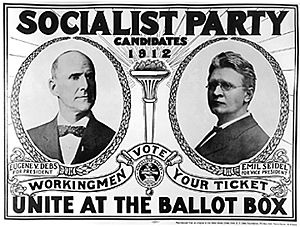- Sewer Socialism
-
Socialism  DevelopmentIdeasEconomic planning · Free association
DevelopmentIdeasEconomic planning · Free association
Equality of opportunity Economic democracy
Adhocracy · Technocracy
Self-management · Direct democracy
Public ownership · Common ownership
Social dividend · Basic income
Production for use
Calculation in kind · Labour voucher
Industrial democracy · Collaboration
Material balance accounting
Social ownership · EconomicsPeopleCharles Hall · Henri de Saint-Simon
Robert Owen · Charles Fourier
William Thompson
Thomas Hodgskin
Louis Blanc · Moses Hess
Karl Marx · Friedrich Engels
Ferdinand Lassalle
William Morris · Mary Harris Jones
Eugene V. Debs · John Dewey
Enrico Barone · Ben Tillett
Edvard Kardelj · Robin Hahnel
Michael AlbertSocialism portal
Politics portalSewer Socialism was a term, originally more or less pejorative, for the American socialist movement that centered in Milwaukee, Wisconsin, and existed from around 1892 to 1960.[1] The term purportedly was coined by Morris Hillquit at the 1932 Milwaukee convention of the Socialist Party of America, as an ironic commentary on the Milwaukee socialists and their perpetual boasting about the excellent public sewer system in the city.[2]
Contents
Ideology
With the creation of the Socialist Party of America, this group formed the core of an element which favored Democratic socialism over Orthodox Marxism, deemphasizing social theory and revolutionary rhetoric and in favor of honest government and efforts to improve public health. The Sewer Socialists fought to clean up what they saw as "the dirty and polluted legacy of the Industrial Revolution,"[3] cleaning up neighborhoods and factories with new sanitation systems, city-owned water and power systems, and improved education. The movement has its origins in the organization of the Social Democratic Party, a precursor to the Socialist Party of America.
Victor Berger
Main article: Victor L. BergerVictor Berger is seen as the manifestation of Sewer Socialism,[3] often compared to Robert La Follette and his representation of Progressivism. He was an Austrian Jewish immigrant, who published English and German daily newspapers.and distributed free copies to every household in Milwaukee before elections. He was the best-known local leader of this tendency. In 1910 he became the first of two Socialists elected to the United States House of Representatives, representing Wisconsin's 5th congressional district (The second was Meyer London of New York.) Berger was reelected in 1918, but was barred from his seat in the House due to his trial and conviction under the 1917 Espionage Act for his public remarks opposing U.S. intervention in the First World War. A special election was called, in which Berger again emerged victorious, but he was denied the seat and it was declared vacant. Berger served the 5th district again from 1923 until 1929, and during his tenure introduced proposals for numerous programs that were subsequently adopted, such as old age pensions, unemployment insurance, and public housing.
Electoral history
In 1910, the Socialists won most of the seats in the Milwaukee city council and county board. This included the first Socialist mayor in the United States, Emil Seidel, who also received the nomination for Vice-President on the Socialist Party ticket in the 1912 election, when the Socialists netted 6% of the vote, their highest-ever percentage. Seidel and Berger both lost their campaigns in 1912, but in 1916, a new Socialist mayor was elected, Daniel Hoan, who remained in office until 1940. Socialists never regained total control over the local government as they did in 1910, but continued to show major influence until the defeat of Daniel Hoan in 1940. The Sewer Socialists elected one more mayor in Milwaukee, Frank P. Zeidler, who served for three full terms (1948-1960). A Socialist has not been elected mayor of a major American city since the end of Zeidler's tenure (although Bernie Sanders, former mayor of Burlington, Vermont and later member of the United States Senate, is a self-identified socialist).
Relationship with the Progressives
Although the Sewer Socialists had many ideas superficially similar to those of the La Follette Progressives, they still had numerous tensions, primarily due to differences in underlying ideology. They rarely cooperated on elections (one notable exception was the 1924 Presidential campaign of Robert M. La Follette, Sr., who was endorsed by the Socialist Party of America), although as a rule the Progressives and Socialists did not run candidates against each other in Milwaukee. The Socialists wanted nothing to do with the Republicans, while the Progressives sometimes worked with their parent party.
See also
Footnotes
- ^ "Socialism in Milwaukee". Wisconsin Historical Society. http://www.wisconsinhistory.org/dictionary/index.asp?action=view&term_id=9192&search_term=socialism. Retrieved 2009-10-11.
- ^ Louis Waldman, Labor Lawyer. New York: E.P. Dutton & Co., 1944; pg. 260. Hillquit was incidentally running against Milwaukee mayor Dan Hoan for the position of National Chairman of the Socialist Party at the 1932 convention, and the mild insult may well have sprung up in that context.
- ^ a b "Milwaukee Sewer Socialism". Wisconsin Historical Society. http://www.wisconsinhistory.org/turningpoints/tp-043/?action=more_essay. Retrieved 2009-10-11.
Further reading
- Beck, Elmer A. The Sewer Socialists: A History of the Socialist Party of Wisconsin, 1897–1940. Fennimore, WI: Westburg Associates, 1982.
- Bekken, Jon. "'No Weapon So Powerful': Working-Class Newspapers in the United States," Journal of Communication Inquiry, Vol. 12, No. 2, pp. 104-119 (1988)
- McCarthy, John M. Making Milwaukee Mightier: Planning and the Politics of Growth, 1910-1960. DeKalb, IL: Northern Illinois University Press, 2009.
- Miller, Sally M. Race, Ethnicity, and Gender in Early Twentieth-Century American Socialism. Garland Reference Library of Social Science, vol. 880. New York and London: Garland Publishing, 1996.
- Zeidler, Frank P. A Liberal in City Government: My Experiences as Mayor of Milwaukee. Milwaukee: Milwaukee Publishers, 2005.
Categories:- History of Milwaukee, Wisconsin
- History of socialism
- Socialism in the United States
- Socialist Party of America
- History of the United States (1865–1918)
Wikimedia Foundation. 2010.


